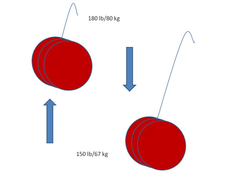Yoyo dieting: Are you putting your health at risk?
Published: October 08, 2021
Many people are caught in the yoyo dieting trap and you may be one of them.
Whatever your reason for losing weight you may have tried various diets and been delighted when you have been successful and attained your weight loss goal.
However, you were probably not delighted when you regained the weight you lost. So you tried another diet, success, followed by weight gain after a few months.
You're back where you started so you try another diet with the same short term losses, but long term gains. You may even find that you end up heavier than you were at the beginning of the diet.
Yoyo dieting describes this pattern of dieting where weight loss is successful in the short term, but weight is regained over time when the diet cannot be sustained.
The dieter repeats this cycle of weight loss and weight gain over and over again in an attempt to attain permanent weight loss. Yoyo dieting may also be referred to as weight cycling.
Weight loss for those who are overweight is often perceived as being a healthy thing to achieve.
Many popular diets stress the health benefits of weight loss, but for weight loss to provide you with sustained health benefits it needs to be permanent.
You probably find it frustrating and a little soul destroying that you diet and lose weight, but cannot keep the weight off.
You're certain you will find the diet that suits you one day.
Whether or not permanent weight loss is your goal, hopefully the next diet you try will be sustainable in the long term as yoyo dieting is now thought to be associated with health risks.
Read the full article to learn more about yoyo dieting and its associated health risks, increasing weight gain, and how to put an end to weight cycling.
References
1.
Field et al. (2004). Association of weight change, weight control practices, and weight cycling among women in the Nurses’ Health Study II. International Journal of Obesity (2004) 28, 1134–1142. doi:10.1038/sj.ijo.0802728
2.
Montani et al. (2006). Weight cycling during growth and beyond as a risk factor for later cardiovascular diseases: the ‘repeated overshoot theory”. International Journal of Obesity 30, S58–S66. doi:10.1038/sj.ijo.0803520
3.
Mahon, K. & Escott-Stump, S. (2000). Krause's Food, Nutrition, & Diet Therapy. (11th ed.). Philadelphia, PA. Saunders
4.
Gaesser, G.A. (2003). Is it necessary to be thin to be healthy? Harvard Health Policy Review. 4(2), 40-47. Retrieved August 10, 2009 from http://www.hcs.harvard.edu/~epihc/currentissue/fall2003/gaesser.pdf
5.
Whitney, E. & Rady Rolfes, S. (2005). Understanding Nutrition. Belmont, CA: Thomson Wadsworth
6.
Zerbe, K.J. (2008). Integrated Treatment of Eating Disorders: Beyond the Body Betrayed. New


